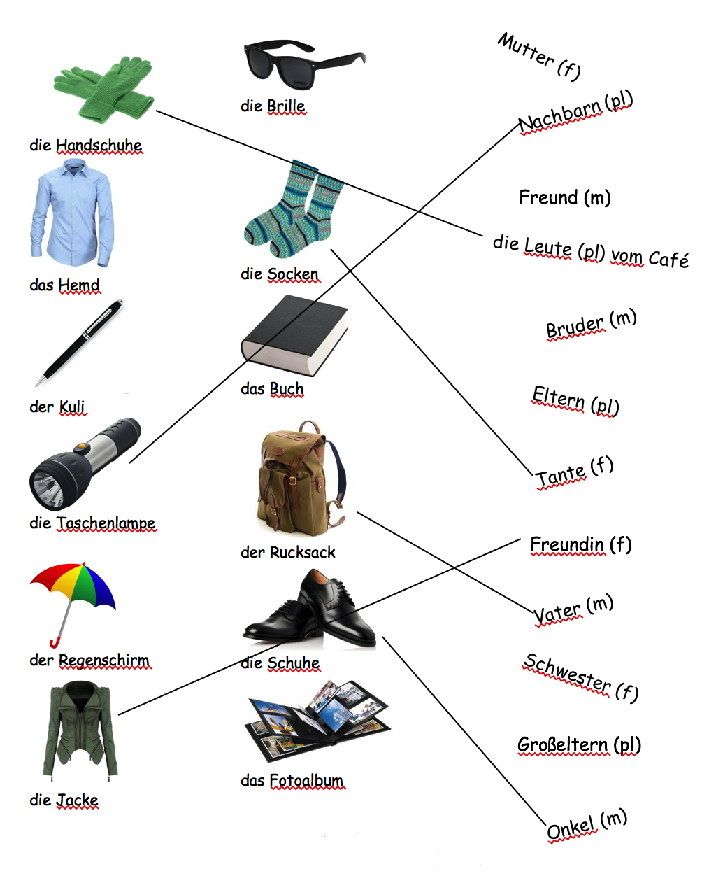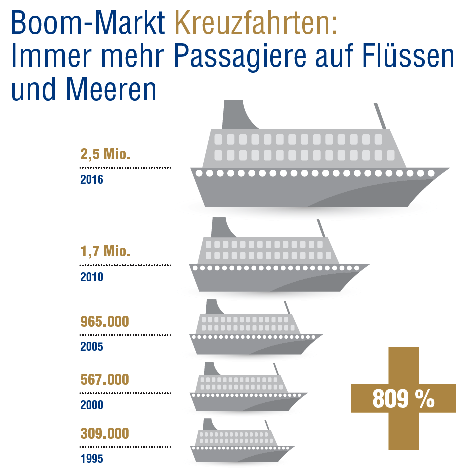| Seite 7 |
Verben mit dem Dativ
|
Übung 5-7a. Besitzverhältnisse erfragen und bestimmen Partnerarbeit. Nach dem Weihnachsfest liegen Geschenke herum. Fragen Sie ihre Partnerin / ihren Partner wem was gehört und zeichnen Sie die Antworten ein. Fragen Sie auch, wie die Geschenke gefallen. (Wem gehört die Brille? Wem gehören die Handschuhe? / Wie gefällt ihr die Sonnenbrille? Wie gefallen ihm die Handschuhe?) See Case Tables, Seite 5-11.
Redemittel:
- Wem gehört die Kamera? → Sie gehört meiner Mutter.
- Gefällt ihr die Kamera? → Ja, sie gefällt ihr sehr.

Übung 5-7b. Gefallen und mißfallen Was gefällt Ihnen? Wie gefällt es Ihnen? Fragen Sie zwei andere, wie ihnen alles gefällt. Benutzen Sie diese Kurzformen:
- "++" = sehr gut
- "+" = gut
- "-" = nicht
- "--" = gar nicht
| ich | Partner Nr. 1 | Partner Nr. 2 |
|---|---|---|
| mein Zimmer / meine Wohnung | ||
| die Universität | ||
| Das Essen in der Mensa | ||
| die Stadt | ||
| das Wetter | ||
| das Hauptfach | ||
| das Auto |
Redemittel: Wie gefällt dir dein Zimmer? Wie gefällt dir das Essen?
- Mathe gefällt mir sehr gut (++).
- Die Stadt gefällt mir (+).
- Das Wetter gefällt mir nicht besonders (-).
- Mein Auto gefällt mir gar nicht (--).
Bericht:
- Mathe gefällt meiner Partnerin nicht. Die Stadt gefällt ihr sehr gut
- Das Wetter gefällt meinem Partner gar nicht. Sein Auto gefällt ihm aber gut.
- ich: mir
- du: dir
- sie: ihr
- er: ihm
Übung 5-7c. Was passiert in den Ferien? This assignment combines previous concepts with the conjunction wenn.
Complete the assignment on BOLT. But before you do the exercise, watch this video! Click here!
Construct complex sentences based on the elements and guided by the English translation.
You will have to change the nouns for the correct cases,
adjust the verbs to agree with the subjects, and use the correct word order. All are complex sentences.
Clauses are marked by a //.
Zum Beispiel:
wenn / gefallen / es / Sie // können / wir / gehen / ins Kino / (If you like, we can go to the movies.) →
Wenn es Ihnen gefällt, können wir ins Kino gehen.
- wenn / meine Eltern / fragen / ich // ich / antworten / sie / immer / mit "nichts"
Whenever my parents ask me, I always answer them with "nothing". - natürlich / sie / glauben / ich / nicht // wenn / ich / sagen / das
Of course they do not believe me when I say that. - ich / sollen / helfen / sie // wenn / wir / planen / ein Urlaub
I am supposed to help them when we plan a vacation. - ich / möchte / meine Eltern / danken // wenn / ich / dürfen / allein / sein
I would like to thank my parents, if I am allowed to be alone. - aber / es / passen / meine Schwester / nicht // wenn / ich / wollen / mitmachen / nicht
But it does not suit my sister when I do not want to participate. - und / das / passieren / wir / jedes Jahr // wenn / wir / der Urlaub / planen
And that happens to use every year when we plan the vacation.
Übung 5-7d. Warum fahren wir nicht mit der U-Bahn zur Uni?
This assignment combines previous concepts with the conjunction weil. Complete the assignment on BOLT.
But before you do the exercise, watch this video! Click here!
Construct complex sentences based on the elements and guided by the English translation.
You will have to change the nouns for the correct cases,
adjust the verbs to agree with the subjects, and use the correct word order. All are complex sentences.
Clauses are marked by a //.
- Jan und Lisa / fliegen / nicht gern // weil / das Essen / schmecken / sie / nicht gut
Jan and Lisa do not like to fly because the food does not taste good to them. - ihr / fahren / mit / die Straßenbahn / zu / der Bahnhof // weil / die Haltestelle / sein / nah
You are taking the street car to the train station because the streetcar stop is close. - Vera / fahren / mit / das Auto / nicht // weil / sie / gefallen / Autos / nicht
Vera does not drive a car because she does not like cars. - es / passieren / ich / oft // weil / der Zug / zu / die Arbeit / oft / haben / Verspätung
It happens to me often because the train to work is often late. - mein Chef / glauben / ich / nicht // weil / sein Zug / selten / haben / Verspätung
My boss does not believe me, because his train is seldom late. - man / fahren / mit / das Fahrrad // weil / es / sein / umweltfreundlich
One rides a bike because it is environmentally friendly.
Die Deutschen reisen gern!Before the Internet, people in the United States often planned trips and vacations through travel agencies, whereas today the powerhouses for tourism and business trdips are online companies, suc as Expedia and booking.com. Not so in Germany. With nearly 10,000 storefront travel offices (das Reisebüro) -- the world's largest per capita -- there are nearly four times as many people employed in the tourist industry as in automobile manufacturing.Why are Germans such avid travelers? For one, all Germans are guaranteed 24 paid vacation days per year, and on average actually receive around six weeks of paid leave. Germans often take more than one longer vacation trip per year (the average trip is 13 days), which explains how in a country with a population of around 81 million, there are nearly 70 million trips of five days or longer per year. 70% of trips are outside of Germany, with over half of them at vacation sites around the Mediterranean Sea, especially in Spain and Italy. These vacations are affordable in large part because one can drive to these destinations. In the past few years, cruise lines have increased greatly in popularity, and deeply discounted airline tickets have made flying an option for almost anyone.
|

